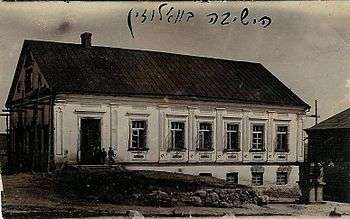Chaim of Volozhin
Chaim of Volozhin (also known as Chaim ben Yitzchok of Volozhin or Chaim Ickovits; January 21, 1749 – June 14, 1821)[1][2] was an Orthodox rabbi, Talmudist, and ethicist. Popularly known as "Reb Chaim Volozhiner" or simply as "Reb Chaim", he was born in Volozhin (a.k.a. Vałožyn or Valozhyn) when it was a part of the Polish-Lithuanian Commonwealth. He died there while it was under the control of the Russian Empire. It is part of present-day Belarus.
Student of the Vilna Gaon
Both he and his elder brother Simcha (d. 1812) studied under Rabbi Aryeh Leib Gunzberg, the author of the Shaagas Aryeh, who was then rabbi of Volozhin, and afterward under Rabbi Raphael ha-Kohen, (the author of the Toras Yekusiel), later of Hamburg.[1]
Aged 25, he was attracted by the fame of the Vilna Gaon, and he became one of the his most prominent disciples. Submitting to his new teacher's method, he began his studies anew, taking up again Torah, Mishnah, Talmud, and even Hebrew grammar. His admiration for the gaon was boundless, and after his death Chaim virtually acknowledged no superior (see Heschel Levin's "Aliyyot Eliyahu", pp. 55–56, Vilna, 1889 OCLC 77975422).[1]
Establishing the Volozhin Yeshiva

It was with the view of applying the methods of the Vilna Gaon that he founded the Volozhin yeshiva in 1803, a yeshiva that remained in operation for nearly 90 years until it was closed in 1892. The yeshiva became the "mother of all Lithuanian-style yeshivas". He began with ten pupils, young residents of Volozhin, whom Chaim maintained at his own expense. It is related that his wife sold her jewelry to contribute to their maintenance. The fame of the institution spread, and the number of its students increased, necessitating an appeal to which the Jews of Russia generously responded. Rabbi Chaim lived to see his yeshiva housed in its own building, and to preside over a hundred disciples ("Chut ha-Meshullash," responsum No. 5,[1] published by his great-grandson OCLC 13995133).
He continued to teach the Vilna Gaon's study method of penetrating analysis of the Talmudic text, seeking to elicit the intent and meaning of the writing of the Rishonim. This approach was followed by all the great Lithuanian yeshivas, such as Slobodka yeshiva, Mir yeshiva, Ponevezh yeshiva, Kelm yeshiva, Kletsk yeshiva, and Telz yeshiva.
Works
His major work is the Nefesh Ha-Chaim ("Living Soul"). Contrary to popular belief, it does not deal solely with complex understandings of the nature of God, but also with secrets of prayer and the importance of Torah, the purpose being "to implant the fear of God, Torah, and pure worship into the hearts of the upright who are seeking the ways of God". It presents a clear and orderly kabbalistic Weltanschauung that addresses many of the same issues as the Hasidic texts of the day. Norman Lamm described its structure:
"The Nefesh ha-Hayyim consists of five parts, four of which are numbered and are called 'gates.' The fifth part, which appears between the third and fourth gates, is unnumbered. The first three gates, which are primarily metaphysical-mystical, number, respectively, twenty-two, eighteen, and fourteen chapters. The fourth gate, or final part, which is more popular and exoteric and extols the study of Torah, contains thirty-four chapters. The unnumbered part, containing eight chapters, is in the nature of a preface to gate 4 (and henceforth will be termed 'pre-4') and deals primarily with ethical material, such as the suppression of pride and other undesirable character traits, especially as it relates to the study of Torah and the performance of the commandments. ... The fact that it is unnumbered indicates that it was written after the rest of the book had been composed and was already in completed manuscript form. Evidence for this may also be found from the glosses and cross-references that are found throughout the book."[3]
In addition, he wrote Ruach Chaim OCLC 30583186, a commentary on Pirkei Avoth.[1] Both titles also play on his name, "Chaim". Thus, for example, "The Spirit of Life" can also be translated as "Chaim's Spirit" or "Chaim's Soul".
Many of his responsa on halakic subjects were lost by fire in 1815.[1]
Family
His brother, known as Zalman of Volozhin, is considered to have been among the greatest students of the Vilna Gaon. Zalman of Volozhin's biography, the hagiographical Toldos Adam, includes many anecdotes related to the author by Rabbi Chaim. Rabbi Chaim's son, Yitzchak, took over the leadership of the yeshiva upon his father's death in 1821. Yitzchak's daughter, Rivka, was married to Rabbi Eliezer Yitzchak Fried, her first cousin. (Eliezer Yitzchak's mother, Esther, was Yitzchak's sister.) Another of Yitzchak's daughters married Naftali Zvi Yehuda Berlin. Among Rabbi Chaim's descendants are the Soloveitchik family.[4]
His great-great-grandson, Shimon Peres, was a major political and military figure in Israel who served as Prime Minister of Israel.[5]
References
- 1 2 3 4 5 6

- ↑ Library of Congress Authorities: Volozhiner, Ḥayyim ben Isaac, 1749-1821
- ↑ Lamm, Norman (1989). Torah Lishmah - Torah for Torah’s Sake: In the Works of Rabbi Hayyim of Volozhin and His Contemporaries. Hoboken, N.J.: Ktav Publishing House, Inc. p. 61. ISBN 0881251178.
- ↑ D. Eliach, Avi Ha'yeshivot, p.21 (1991)
- ↑ Rabbi Chaim Volozhiner's grandson Rabbi Zvi Meltzer is the maternal grandfather of Shimon Peres.